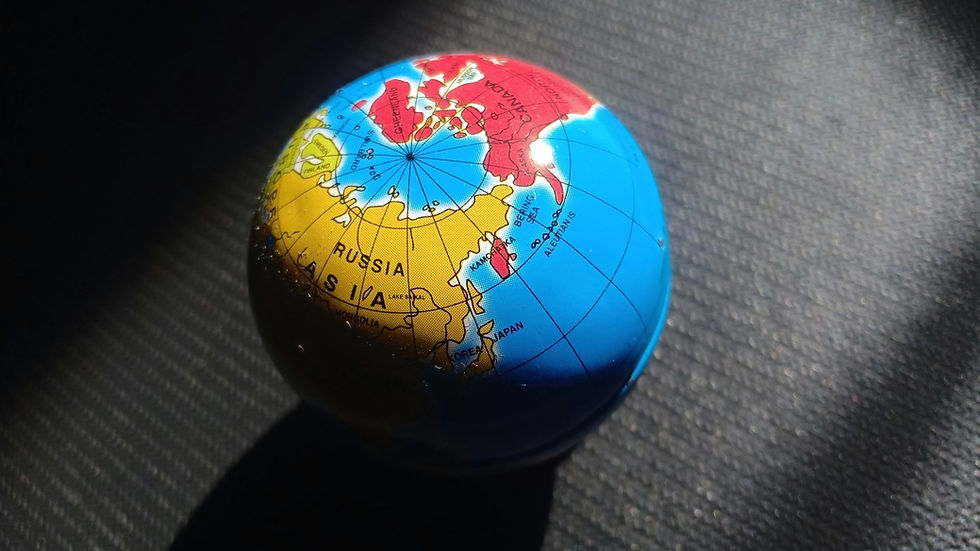Moving beyond Rhetoric: Three ideas on how to be authentically International-Minded
- Admin
- Jun 22, 2025
- 3 min read
In Part 1, I explored why international-mindedness often feels like a buzzword—performative gesture and PR-friendly images masking deeper, systemic issues. But cynicism alone won't get us where we need to go. So, how can we move beyond surface-level engagement and toward something authentic, purposeful, and transformative?
Castro, Lundgren, & Woodin (2013) identify three key components of genuine international-mindedness: multilingualism, intercultural understanding, and global engagement. I want to unpack how we can leverage these ideas starting with reflection, and building outward, into meaningful global action:
Redefining Multilingualism: Language as an Inside-Out Journey
Being Multilingual isn't solely about vocabulary, grammar, sentence construction. This mistakes multilingualism as a solely external endeavour, it's purpose is built on necessity - communication with others. We need understand, instead that language learning shapes identities, builds empathy, and reshapes how we see ourselves and our place in the world.
Some ideas for how to encourage connections between language and learning about ourselves, is inviting students to share personal language stories. Integrating how language connects them to their family histories, cultures, and sense of self. This can be done in the classroom integrated into inquiry. In doing so, we value how language shapes ideas, moving from the performative to practice. Additionally, incorporating reflection as routine and asking students how learning another language changes the way they see themselves and others is important.
Inside-Out Thinking: From 'How' to 'Why' We Engage
When we talk about intercultural understanding, we often focus on "how" we engage with others—celebrations, cultural days, food festivals. This rarely leads to deeper transformation. Instead, we need to shift our focus to the why behind these interactions. We need to encourage young people to engage in critical reflection, questioning our assumptions, biases, and privileges.
Some ideas include, embedding critical reflection into learning daily, discussing themes like power and identity. Schools may introduce reflexive journaling as a regular daily practice for students. Most of the work that needs to happen is in the development of empathy, so building sustained partnerships with communities or schools in different cultural contexts, and encouraging ongoing dialogue and genuine relationships allows students to actively take other perspectives.
It important to note that we need a shift away from merely explaining these ideas as content but rather a reframing our pedagogical approaches and assessment through this lens. Similarly, we often make the mistake of teaching wellbeing - so students can recite definitions of wellbeing and tell you what it looks like, all while existing in a system that acts as a detriment to their health. If instead of explaining we focused on modelling, I'm curious how it might change the way teachers interact and learn.
Action-Based Learning: Reflection Driving Real-World Action
I think if we can nail authentic multilingualism and critical reflection this will naturally lead students to identify issues they genuinely care about—issues they feel personally connected to and passionate about.
If we want to create actual impact, then student-driven projects cannot just be simulated representations of change but drive actual change.
We need to support students to identify real global or local challenges they feel connected to and then guide them in creating thoughtful, measurable action plans. I think the barrier to this I've noticed is that engagement in global projects ultimately is in the service of self-interest, CV padding opportunities. This performative engagement, I believe, is a direct result of little connection to one's self, identity and a lack of reflection. Ultimately we start by getting students to 'care', then to act.
Embracing the "Greater Fool": Courage, Optimism, and Risk
I mentioned in the initial post, the television series The Newsroom and Will McAvoy's challenge of “We aren’t the greatest... but we can be.”
The finale of Season 1 introduces the concept of the "greater fool"—someone willing to risk failure because they believe success is possible. I think true international-mindedness demands educators and students become greater fools. Often this means stepping into discomfort, having the courage to reflect honestly, and take action.
In that final episode, McAvoy is confronted by the same college student who asked him the question in Episode 1. He says to her "ask me your idiot question again". “What makes America the greatest country in the world?”
He simply responds "You Do".

Comments